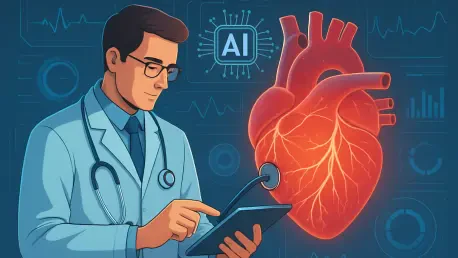What if a single decision could save a heart from failing, but the right information is buried in thousands of pages of research that clinicians struggle to access in time? Every day, doctors face this daunting reality as cardiovascular disease continues to claim millions of lives globally, with over 17.9 million deaths annually, according to the World Health Organization. The pressure to make swift, accurate choices in the face of such a crisis has never been greater. Now, a groundbreaking partnership between the American College of Cardiology (ACC) and OpenEvidence is harnessing artificial intelligence (AI) to deliver critical insights at the speed of life, transforming how heart care is approached in clinical settings.
Why This Matters: AI as a Lifeline in Heart Care
Cardiovascular disease stands as the leading cause of mortality worldwide, placing an unprecedented burden on healthcare systems already stretched thin. Clinicians often grapple with the challenge of staying abreast of rapidly evolving research while managing high patient volumes. The integration of AI offers a beacon of hope, promising to distill vast amounts of data into actionable guidance within moments, a capability that could mean the difference between life and death.
This urgency is precisely why the collaboration between ACC, a cornerstone in cardiovascular science, and OpenEvidence, an innovator in AI technology, is so pivotal. By embedding cutting-edge tools into everyday practice, this partnership aims to alleviate the strain on providers, ensuring that evidence-based decisions are not just possible but instantaneous. The potential to enhance patient outcomes through such innovation marks a turning point in addressing a global health epidemic.
The Core of the Crisis: Tackling a Deadly Epidemic
Beyond the staggering statistics, the human toll of heart disease reveals a deeper struggle—healthcare providers often lack the time to navigate complex guidelines under pressure. With patient cases growing in complexity, the demand for precise, up-to-date information at the point of care has intensified. This gap in efficiency can delay critical interventions, amplifying risks for those in need.
Recognizing this challenge, ACC and OpenEvidence have forged an alliance to bridge the divide between research and real-world application. Their combined expertise seeks to empower clinicians with tools that streamline decision-making, directly confronting the epidemic’s scale. This effort is not merely about technology but about saving lives through smarter, faster care delivery.
Innovations at Work: AI-Driven Advances in Cardiology
At the heart of this collaboration are transformative initiatives designed to integrate AI seamlessly into cardiovascular practice. One standout feature is real-time decision support, where OpenEvidence’s platform delivers ACC’s trusted guidelines and research directly to clinicians during patient interactions. This eliminates the lag between question and answer, enabling immediate, informed choices.
Another key focus is addressing specific clinical gaps through targeted solutions. An expert work group, comprising seasoned cardiologists, identifies pressing questions and knowledge deficiencies, crafting tailored resources to meet frontline needs. These efforts ensure that AI tools are not generic but finely tuned to the unique challenges of heart care.
Community engagement also plays a vital role, with initiatives like the ACC/OpenEvidence AI Resource Center and a dedicated podcast series educating providers on AI’s potential. Showcases at the ACC Annual Scientific Session further spotlight these advancements, inspiring adoption across the medical field. Early pilot results indicate a notable boost in clinician confidence, with some reporting up to a 30% reduction in decision-making time.
Expert Perspectives: Balancing Tech and Compassion
Leaders from both organizations underscore the ethical foundation of this endeavor. Cathleen C. Gates, ACC Chief Executive Officer, articulates a crucial principle: “AI must serve as a partner in care, enhancing the human connection that defines medicine, not overshadowing it.” Her words highlight the commitment to maintaining empathy at the core of technological progress.
Echoing this sentiment, Daniel Nadler, PhD, CEO of OpenEvidence, emphasizes the universal relevance of their mission: “Heart health touches every facet of medicine, from routine checkups to emergency interventions. Pairing our AI platform with ACC’s authoritative content ensures clinicians have vital insights, no matter their specialty.” These insights reflect a shared vision of innovation grounded in patient well-being, prioritizing trust over automation.
Empowering Clinicians: Practical AI Tools for Everyday Care
For healthcare providers ready to embrace this shift, the partnership offers tangible ways to incorporate AI into daily workflows. Accessing the OpenEvidence platform allows instant retrieval of ACC-approved content, ensuring decisions during patient consultations are rooted in the latest evidence. This tool acts as a digital assistant, cutting through information overload with precision.
Educational resources further support this transition, with the AI Resource Center and podcast series providing in-depth explorations of AI applications. These materials address common hesitations, equipping clinicians with the knowledge to use technology confidently. Engaging with such content fosters a culture of learning amid rapid advancements.
Providers are also encouraged to contribute feedback through the expert work group, sharing real-world challenges to shape future AI solutions. This collaborative approach ensures that tools evolve in alignment with actual needs, enhancing their relevance. Together, these steps enable clinicians to deliver timely, compassionate care while leveraging the power of AI.
Reflecting on Impact: A New Era in Heart Care
Looking back, the alliance between ACC and OpenEvidence carved a transformative path in cardiovascular medicine. Their joint efforts redefined how clinicians accessed critical information, slashing decision-making delays and elevating patient outcomes. The fusion of AI with evidence-based practice proved to be a game-changer, setting a precedent for technology’s role in healthcare.
As this partnership unfolded, it became clear that the journey was just beginning. Continued collaboration promised to refine these tools, addressing emerging challenges in heart care. Clinicians and stakeholders were poised to drive this momentum forward, exploring new frontiers in AI to ensure that every heartbeat received the attention it deserved.









